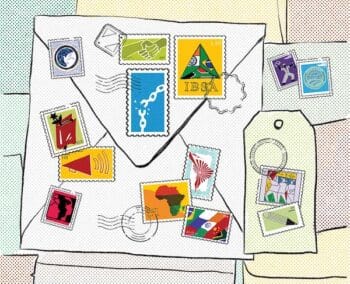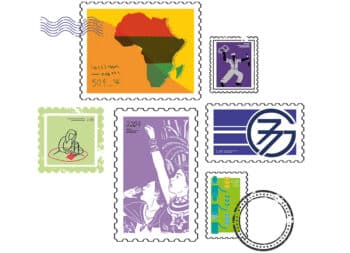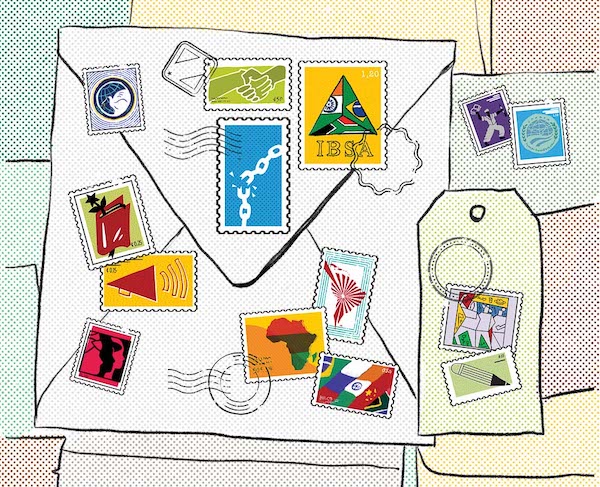Dear friends,
Greetings from the desk of Tricontinental: Institute for Social Research.
 On 24 February 2023, the Chinese Foreign Ministry released a twelve-point plan entitled ‘China’s Position on the Political Settlement of the Ukraine Crisis’. This ‘peace plan’, as it has been called, is anchored in the concept of sovereignty, building upon the well-established principles of the United Nations Charter (1945) and the Ten Principles from the Bandung Conference of African and Asian states held in 1955. The plan was released two days after China’s senior diplomat Wang Yi visited Moscow, where he met with Russia’s President Vladimir Putin. Russia’s interest in the plan was confirmed by Kremlin spokesperson Dmitry Peskov shortly after the visit: ‘Any attempt to produce a plan that would put the [Ukraine] conflict on a peace track deserves attention. We are considering the plan of our Chinese friends with great attention’.
On 24 February 2023, the Chinese Foreign Ministry released a twelve-point plan entitled ‘China’s Position on the Political Settlement of the Ukraine Crisis’. This ‘peace plan’, as it has been called, is anchored in the concept of sovereignty, building upon the well-established principles of the United Nations Charter (1945) and the Ten Principles from the Bandung Conference of African and Asian states held in 1955. The plan was released two days after China’s senior diplomat Wang Yi visited Moscow, where he met with Russia’s President Vladimir Putin. Russia’s interest in the plan was confirmed by Kremlin spokesperson Dmitry Peskov shortly after the visit: ‘Any attempt to produce a plan that would put the [Ukraine] conflict on a peace track deserves attention. We are considering the plan of our Chinese friends with great attention’.
Ukraine’s President Volodymyr Zelensky welcomed the plan hours after it was made public, saying that he would like to meet China’s President Xi Jinping as soon as possible to discuss a potential peace process. France’s President Emmanuel Macron echoed this sentiment, saying that he would visit Beijing in early April. There are many interesting aspects of this plan, notably a call to end all hostilities near nuclear power plants and a pledge by China to help fund the reconstruction of Ukraine. But perhaps the most interesting feature is that a peace plan did not come from any country in the West, but from Beijing.
 When I read ‘China’s Position on the Political Settlement of the Ukraine Crisis’, I was reminded of ‘On the Pulse of Morning’, a poem published by Maya Angelou in 1993, the rubble of the Soviet Union before us, the terrible bombardment of Iraq by the United States still producing aftershocks, the tremors felt in Afghanistan and Bosnia. The title of this newsletter, ‘Birth Again the Dream of Global Peace and Mutual Respect’, sits at the heart of the poem. Angelou wrote alongside the rocks and the trees, those who outlive humans and watch us destroy the world. Two sections of the poem bear repeating:
When I read ‘China’s Position on the Political Settlement of the Ukraine Crisis’, I was reminded of ‘On the Pulse of Morning’, a poem published by Maya Angelou in 1993, the rubble of the Soviet Union before us, the terrible bombardment of Iraq by the United States still producing aftershocks, the tremors felt in Afghanistan and Bosnia. The title of this newsletter, ‘Birth Again the Dream of Global Peace and Mutual Respect’, sits at the heart of the poem. Angelou wrote alongside the rocks and the trees, those who outlive humans and watch us destroy the world. Two sections of the poem bear repeating:
Each of you, a bordered country,
Delicate and strangely made proud,
Yet thrusting perpetually under siege.
Your armed struggles for profit
Have left collars of waste upon
My shore, currents of debris upon my breast.
Yet today I call you to my riverside,
If you will study war no more. Come,
Clad in peace, and I will sing the songs
The Creator gave to me when I and the
Tree and the rock were one.
Before cynicism was a bloody sear across your
Brow and when you yet knew you still
Knew nothing.
The River sang and sings on.…
History, despite its wrenching pain
Cannot be unlived, but if faced
With courage, need not be lived again.
 History cannot be forgotten, but it need not be repeated. That is the message of Angelou’s poem and the message of the study we released last week, Eight Contradictions of the Imperialist ‘Rules-Based Order’.
History cannot be forgotten, but it need not be repeated. That is the message of Angelou’s poem and the message of the study we released last week, Eight Contradictions of the Imperialist ‘Rules-Based Order’.
In October 2022, Cuba’s Centre for International Policy Research (CIPI) held its 7th Conference on Strategic Studies, which studied the shifts taking place in international relations, with an emphasis on the declining power of the Western states and the emergence of a new confidence in the developing world. There is no doubt that the United States and its allies continue to exercise immense power over the world through military force and control over financial systems. But with the economic rise of several developing countries, with China at their head, a qualitative change can be felt on the world stage. An example of this trend is the ongoing dispute amongst the G20 countries, many of which have refused to line up against Moscow despite pressure by the United States and its European allies to firmly condemn Russia for the war in Ukraine. This change in the geopolitical atmosphere requires precise analysis based on the facts.
To that end, our latest dossier, Sovereignty, Dignity, and Regionalism in the New International Order (March 2023), produced in collaboration with CIPI, brings together some of the thinking about the emergence of a new global dispensation that will follow the period of U.S. hegemony. The text opens with a foreword by CIPI’s director, José R. Cabañas Rodríguez, who makes the point that the world is already at war, namely a war imposed on much of the world (including Cuba) by the United States and its allies through blockades and economic policies such as sanctions that strangle the possibilities for development. As Greece’s former Finance Minister Yanis Varoufakis said, coups these days ‘do not need tanks. They achieve the same result with banks’.
The U.S. is attempting to maintain its position of ‘single master’ through an aggressive military and diplomatic push both in Ukraine and Taiwan, unconcerned about the great destabilisation this has inflicted upon the world. This approach was reflected in U.S. Defence Secretary Lloyd Austin’s admission that ‘We want to see Russia weakened’ and in U.S. House Foreign Affairs Committee Chairman Michael McCaul’s statement that ‘Ukraine today—it’s going to be Taiwan tomorrow’. It is a concern about this destabilisation and the declining fortunes of the West that has led most of the countries in the world to refuse to join efforts to isolate Russia.
 As some of the larger developing countries, such as China, Brazil, India, Mexico, Indonesia, and South Africa, pivot away from reliance upon the United States and its Western allies, they have begun to discuss a new architecture for a new world order. What is quite clear is that most of these countries—despite great differences in the political traditions of their respective governments—now recognise that the United States ‘rules-based international order’ is no longer able to exercise the authority it once had. The actual movement of history shows that the world order is moving from one anchored by U.S. hegemony to one that is far more regional in character. U.S. policymakers, as part of their fearmongering, suggest that China wants to take over the world, along the grain of the ‘Thucydides Trap’ argument that when a new aspirant to hegemony appears on the scene, it tends to result in war between the emerging power and existing great power. However, this argument is not based on facts.
As some of the larger developing countries, such as China, Brazil, India, Mexico, Indonesia, and South Africa, pivot away from reliance upon the United States and its Western allies, they have begun to discuss a new architecture for a new world order. What is quite clear is that most of these countries—despite great differences in the political traditions of their respective governments—now recognise that the United States ‘rules-based international order’ is no longer able to exercise the authority it once had. The actual movement of history shows that the world order is moving from one anchored by U.S. hegemony to one that is far more regional in character. U.S. policymakers, as part of their fearmongering, suggest that China wants to take over the world, along the grain of the ‘Thucydides Trap’ argument that when a new aspirant to hegemony appears on the scene, it tends to result in war between the emerging power and existing great power. However, this argument is not based on facts.
Rather than seek to generate additional poles of power—in the mould of the United States—and build a ‘multipolar’ world, developing countries are calling for a world order rooted in the UN Charter as well as strong regional trade and development systems. ‘This new internationalism can only be created—and a period of global Balkanisation avoided’, we write in our latest dossier, ‘by building upon a foundation of mutual respect and strength of regional trade systems, security organisations, and political formations’. Indicators of this new attitude are present in the discussions taking place in the Global South about the war in Ukraine and are reflected in the Chinese plan for peace.
 Our dossier analyses at some length this moment of fragility for U.S. power and its ‘rules-based international order’. We trace the revival of multilateralism and regionalism, which are key concepts of the emerging world order. The growth of regionalism is reflected in the creation of a host of vital regional bodies, from the Community of Latin American and Caribbean States (CELAC) to the Shanghai Cooperation Organisation (SCO), alongside increasing regional trade (with the BRICS bloc being a kind of ‘regionalism plus’ for our period). Meanwhile, the emphasis on returning to international institutions for global decision-making, as evidenced by the formation of the Group of Friends in Defence of the UN Charter, for example, illustrates the reinvigorated desire for multilateralism.
Our dossier analyses at some length this moment of fragility for U.S. power and its ‘rules-based international order’. We trace the revival of multilateralism and regionalism, which are key concepts of the emerging world order. The growth of regionalism is reflected in the creation of a host of vital regional bodies, from the Community of Latin American and Caribbean States (CELAC) to the Shanghai Cooperation Organisation (SCO), alongside increasing regional trade (with the BRICS bloc being a kind of ‘regionalism plus’ for our period). Meanwhile, the emphasis on returning to international institutions for global decision-making, as evidenced by the formation of the Group of Friends in Defence of the UN Charter, for example, illustrates the reinvigorated desire for multilateralism.
The United States remains a powerful country, but it has not come to terms with the immense changes taking place in the world order. It must temper its belief in its ‘manifest destiny’ and recognise that it is nothing more than another country amongst the 193 members states of the United Nations. The great powers—including the United States—will either find ways to accommodate and cooperate for the common good, or they will all collapse together.
At the start of the pandemic, the head of the World Health Organisation, Dr Tedros Adhanom Ghebreyesus, urged the countries of the world to be more collaborative and less confrontational, saying that ‘this is the time for solidarity, not stigma’ and repeating, in the years since, that nations must ‘work together across ideological divides to find common solutions to common problems’. These wise words must be heeded.
Warmly,
Vijay

